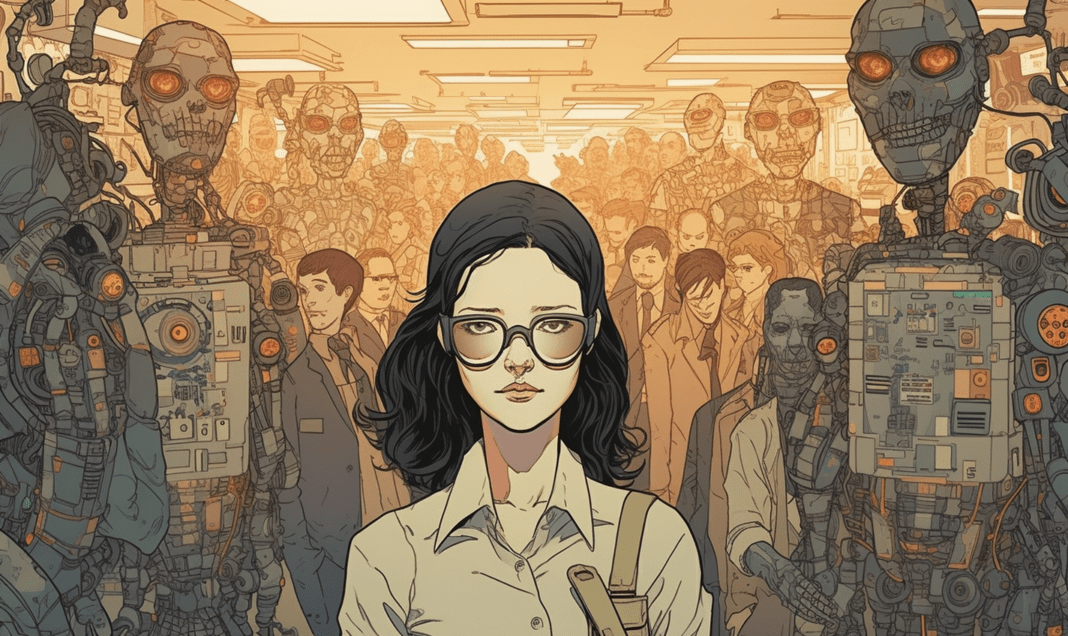In the ever-evolving landscape of artificial intelligence (AI), myths and misconceptions abound like phantoms in the night. As we grapple with this technological marvel, we’re often led astray by the myths that surround it, obscuring its true potential and capabilities. It’s high time we cast a discerning eye on these myths, unraveled them, and discovered the real story behind ChatGPT and its role in marketing.
Myth #1: AI can replace human minds.
The notion that AI is poised to replace human creativity and ingenuity is the oldest and most enduring myth in the world of machine learning. While AI can certainly assist marketers in automating repetitive tasks, it falls woefully short in terms of creative thinking and strategic decision-making. AI can be a helpful sidekick, but it can’t don the cape and assume the role of the hero in your marketing efforts.
Myth #2: AI understands everything it learns.
Another pervasive fallacy is the belief that AI has attained a level of understanding comparable to that of humans. While AI has made significant strides in natural language processing and sentiment analysis, it remains an imperfect interpreter of human emotions and intentions. It’s like expecting a chess-playing computer to comprehend the passion of a grandmaster’s moves.
Myth #3: AI can fix everything.
There’s a misguided belief that AI is a panacea, a magical elixir that can cure all marketing woes with a simple incantation. The truth is that implementing AI in marketing requires time, effort, and a dash of patience. It’s not a quick fix, but a process that involves training, refinement, and integration into existing strategies. Expecting instant results is akin to planting a seed and demanding a tree by sunrise.
Myth #4: AI is prohibitively expensive.
Some believe that AI is an exclusive club for big spenders, leaving small businesses to peer wistfully through the velvet rope. In reality, the cost of AI implementation has plummeted as the technology has advanced. Affordable AI tools with flexible pricing models now cater to businesses of all sizes. AI is not a luxury; it’s a practical option.
Myth #5: AI is only for big tech businesses.
There’s a misapprehension that you need a PhD in machine learning to wield AI effectively. This couldn’t be further from the truth. AI-driven marketing has democratized the field, empowering businesses large and small across various industries. It’s not about expertise; it’s about harnessing the capabilities AI offers.
So, what’s the problem with these myths? They can lead marketers astray, fostering unrealistic expectations and a misguided reliance on AI as a silver bullet. Overestimating AI can blind us to the ethical challenges of privacy and security and lead us to trust machines with sensitive data better protected by human judgment.
Conversely, these myths can also deter businesses from embracing AI. Some may view it as an unattainable luxury, while others fear it as a harbinger of job losses. These misconceptions stifle innovation and limit the transformative potential of AI.
To transcend these myths and forge a fruitful relationship with AI, education is key. Marketers should ensure decision-makers have access to accurate information about AI’s capabilities and limitations. A culture of learning will enable individuals to set realistic expectations while daring to dream big.
But let’s not stop at dispelling myths. Let’s explore how marketers can harness AI’s powers to reshape their approach to consumers:
1. Deliver a more personalized service.
AI’s gift to marketers is the ability to personalize at scale. By analyzing customer data and behavior, AI allows businesses to deliver highly relevant and personalized content and offers. This improves customer engagement and encourages repeat visits, creating a virtuous cycle of customer satisfaction.
2. Make content more interactive.
AI can breathe life into static content, transforming it into interactive and gamified experiences. From AI-driven quizzes to personalized product configurators, these interactive elements enhance customer engagement and keep them glued to your digital offerings.
3. Offer customer service that anticipates.
With AI-powered chatbots and virtual assistants, customer service can be elevated to new heights. AI enables instant, personalized responses, making customers feel heard. Moreover, AI’s predictive capabilities allow businesses to anticipate customer needs and proactively offer support, leading to higher customer satisfaction.
4. Free yourselves for bigger projects.
AI is the ultimate time liberator. By automating repetitive tasks such as email marketing, social media posting, and ad optimization, it allows marketers to focus on more significant challenges. With AI as your ally, you can conquer the mountains that have long lingered on your to-do list.
In conclusion, ChatGPT and AI, in general, are not enigmatic figures to be feared or idolized. They are tools, instruments in the hands of marketers to craft more personalized, engaging, and efficient strategies. By dispelling the myths, embracing education, and exploring the possibilities, marketers can wield AI as a force for good in the digital marketing landscape, creating a brighter and more exciting future.




